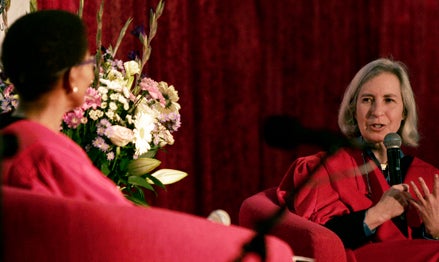Harvard Law School Dean Martha Minow gave the Third Annual Reconciliation Lecture at the University of the Free State in South Africa on Feb. 24. The speech, titled “Forgiveness, Law and Justice,” focused on forgiveness of people, societies and nations and the role the law plays in helping reconciliation after a wrongdoing. Her talk was delivered just a week after a violent, racist attack at the South African university.
In her opening remarks Minow told the audience: “The issue of getting along after conflict is urgent.” As noted in a news report posted on Free State’s website: “With these few words, Professor Minow exposed the essence of not only her lecture, but also the central concern of the entire university community.” Read full report of the lecture here.
Minow defined forgiveness as a conscious, deliberate decision. It is not an obligation, she said, but a choice held at the discretion of one who was harmed. Forgiveness can operate not just between individuals but also between communities, societies, and nations.
Law may play many roles in making forgiveness possible, she said. But it may also discourage forgiveness, by penalizing those who apologize or by constructing adversarial processes that make forgiveness less likely. But law, she said, can also give people chances to meet together, in spaces where they may apologize and forgive.
Almost 20 years after South Africa made the peaceful transition from racial Apartheid to democracy, Minow pointed out that the South African Truth and Reconciliation Commission, the TRC, may have its critics but it has inspired many to forgive and has served as a model for similar efforts in other countries. A combination of religious, political, and communal ideas about the value of reconciliation and forgiveness framed the TRC for the public, she said, and for many, resonated with beliefs and hopes.
Minow, an expert on human rights, wrote about South Africa’s TRC in her 1997 book “Between Vengeance and Forgiveness: Facing History After Genocide and Mass Violence.”
